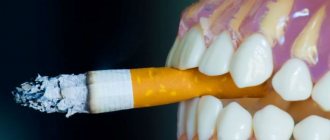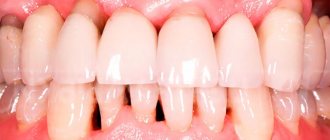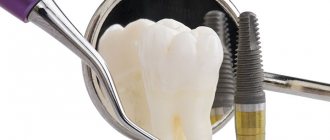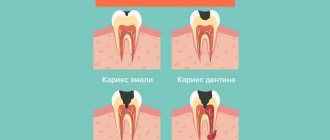Where does bad breath come from after quitting smoking?
Bad breath, or, in other words, halitosis, in the case of people who have given up smoking, appears due to dysbiosis of the oral cavity. After an abrupt cessation of the intake of nicotine, hydrocyanic acid and tars, a restructuring of all metabolic processes occurs, including changes in the functioning of the gastrointestinal tract, and the oral cavity, intestines and respiratory tract begin to be populated by beneficial bacteria, while harmful microflora die. This process lasts no more than a few weeks and, with the right lifestyle, goes away without a trace.
Considering that smoking and healthy teeth are not compatible, it is not difficult to understand that an unpleasant odor can also be an alarming signal that requires a visit to the dentist. By settling on the surface of the teeth, tobacco tar destroys the enamel, causing caries and periodontal disease, the manifestation of which, in fact, is halitosis.
An unpleasant odor is also emitted by sputum secreted from the lungs and bronchi, which will create discomfort until the respiratory tract is completely cleared. And finally, in those who quit smoking, bad breath is explained by increased consumption of sweets as an alternative to cigarettes, which causes active breakdown of protein in the oral cavity.
What is the smell of your mouth?
If you find yourself with bad breath and are in doubt about which doctor to contact first, try to assess the nature of the smell, its intensity, taste, time of onset or exacerbation.
Hydrogen sulfide odor from the mouth
A hydrogen sulfide smell usually indicates disturbances in the digestive process. Especially if after eating there is belching, bloating, nausea, vomiting, abdominal pain, etc. Also, people with an unpleasant hydrogen sulfide odor are characterized by the appearance of a white coating on the root of the tongue, regardless of food intake and oral hygiene procedures. Most often, patients with these symptoms have gastritis or peptic ulcer due to increased acidity of gastric juice.
Sour breath
Sour breath also indicates gastroenterological diseases. Typically, a sour smell appears in the early stages of gastritis and is often the only symptom of the disease.
Bitter breath
A bitter odor and a bitter taste in the mouth, regardless of the time of day and food intake, may indicate liver and gallbladder diseases. Often an additional symptom is the appearance of a yellow coating on the tongue, despite hygiene procedures. If the disease is in the early stages of development, there may be no other symptoms other than an unpleasant odor and plaque. Over time, digestive disorders, general deterioration in health, pain in the side, etc. are possible.
Smell of acetone from the mouth
The smell of acetone and a sweetish taste most often indicate endocrine disorders, in particular the development of diabetes mellitus. Considering the fact that in many cases diabetes is asymptomatic and is detected in the patient when critical pathologies are identified, timely contact with a doctor when the smell appears can protect you from serious illness.
Ammonia and putrid odors
Ammonia-like breath is an indicator of a disease of the genitourinary system, usually the kidneys or bladder. A pungent putrid odor is a typical manifestation of dental diseases: diseases of the teeth and gums, depending on the degree of development, can be characterized by a sharp unpleasant odor. Often, with dental diseases, a white or yellowish coating on the tongue may be observed.
Possible consequences
Bad breath is not only an annoying phenomenon, but also an alarming symptom of a number of serious diseases. To rule out their presence, you should definitely consult a doctor, take a comprehensive blood test and undergo a full examination by specialized specialists.
If you ignore halitosis, artificially masking its presence with menthol aerosol and other tricks, it is easy not to notice how an ailment that could be defeated in no time or even prevented will go into a chronic stage and become a companion for life. In addition, aesthetic dentistry is not cheap at all, and purchasing implants instead of your own, healthy teeth is an extremely expensive and dubious pleasure.
How to get rid of unpleasant odor after smoking
There is only one way to get rid of an unpleasant odor after quitting smoking - an integrated approach, including cleansing the lungs and bronchi, dental treatment and normalizing the functioning of the stomach.
So, first of all, it is necessary to do inhalations with disinfectant compounds that help remove from the body the layer of tar and other products of tobacco combustion that have settled on the mucous membranes.
Secondly, in the first time after quitting cigarettes, it is important to observe oral hygiene more carefully, not forgetting to brush your teeth with a good paste with a high calcium content after every meal and even drink.
Thirdly, you should be more selective in matters of nutrition, giving preference to vegetables and fruits, and categorically refusing hot, spicy foods and saturated sugars. And, to complete the set of measures, those who quit smoking need to gargle and gargle with herbal solutions.
Conventional rinses will not work here, since in this case it is important not just to deodorize the mouth, but to effectively disinfect it. Dentists recommend that anyone who, having given up smoking, fears for their teeth and suffers from bad breath, during the first years after quitting tobacco, should visit a doctor for preventive purposes once every two to three months, instead of the usual twice a year.
Myths about the benefits of nicotine or Still worth quitting
To smoke or not to smoke
- this choice in the modern world still remains a personal matter for everyone. However, recently, smoking patients have been increasingly restricted in their rights: bans on smoking in public places are being introduced, cigarette packs are “decorated” with scary pictures, and in some countries ideas are being seriously discussed to ban the sale of cigarettes to people born after a certain year. In response, smokers appeal to research data on the positive effects of nicotine. What is this - a scientific revolution or simple self-deception?
The approach to limiting the spread of tobacco products and smoking is absolutely logical: according to WHO, globally, tobacco kills about 6 million users and former tobacco users every year, and the economy suffers losses of more than half a trillion dollars. What’s even sadder is that non-smokers who are exposed to second-hand smoke die – more than 890,000 such cases occur annually. According to WHO forecasts, if the situation does not change, tobacco will kill up to one billion people this century, because nicotine addiction is one of the main factors risk of developing a range of chronic diseases, including cancer, lung disease and cardiovascular disease.
However, recently there has been an increasing consensus that although nicotine is highly addictive, it can be beneficial for the body. Are there any compelling arguments in favor of this point of view?
Various psychopharmacological studies of nicotine and tobacco have emerged since the last third of the twentieth century - driven by the need to understand the role nicotine plays in tobacco use, to categorize nicotine as a drug of abuse, to develop a pharmacological basis for the treatment of tobacco dependence, and to explore the potential of nicotine for the treatment or prevention of various disorders (for example, Alzheimer's disease, hyperactivity disorder, attention deficit disorder and other diseases).
In particular, studies have been conducted on the effect of nicotine on the cognitive functions of the human brain. A study that included patients with Alzheimer's disease found that nicotine has multifunctional properties, including promotion of procognitive effects in humans, rodents and primates and neuroprotective effects, but its use as a therapeutic agent is limited due to already known side effects on the cardiovascular system and other negative consequences on the body. Research in this direction continues, in particular, the possibilities of the nicotine metabolite, cotinine, are being analyzed.
is known to affect the brain
as well as the most important neurotransmitter - acetycholine: it causes the brain to produce “hormones of joy” - dopamine and serotonin. Since a deficiency of these hormones leads to depression, a group of scientists made the logical assumption that this disease could be treated with nicotine, and even conducted relevant studies on humans. They have shown that low doses of nicotine contained in nicotine patches can have an antidepressant effect. However, other studies suggest the opposite: nicotine patches produced only short-term improvements in patients suffering from depression, with few side effects. Due to the high health risks, the patches have not been recommended for clinical use in this disease.
It is obvious that pharmaceutical research into the properties of nicotine will continue, and perhaps in the future, on their basis, it will be possible to develop drugs for the treatment of certain ailments. However, today there is no work indicating that nicotine will benefit the body of a healthy person in the medium and long term.
There are plenty of facts in favor of the destructive effects of smoking on healthy people: in smoking patients, the condition of the skin worsens - the turgor decreases, the skin looks drier, takes on an unhealthy shade, and wrinkles appear earlier. Teeth suffer - tooth enamel cracks, gums are affected, tobacco tar is deposited on them, which gives the teeth a characteristic yellow color. People around them feel an unpleasant odor from their mouth, fingers, hair and clothes, and the smoking patient himself becomes less able to distinguish tastes and smells over time.
But while these shortcomings can still be accepted, it’s hard to argue with the fact that smoking is the leading preventable cause of death worldwide. Smoking increases the risks of heart attacks, strokes, vascular atherosclerosis, hypertension, arrhythmia, and is also responsible for the occurrence of 15 types of cancer. Smoking also has a negative effect on the condition of the blood and tissues, and contributes to the narrowing of peripheral blood vessels.
Research shows that most smoking patients who are aware of the dangers of tobacco want to quit smoking. The difficulty of overcoming tobacco addiction is associated, first of all, with nicotine, which in fact turns out to be a very strong drug, causing regular and uncontrolled use and pathological craving, and in the case of attempts to give up the bad habit, provoking withdrawal syndrome, accompanied by growing anxiety, irritability, anxiety, etc.
WHO experts believe that consultations with specialists and modern medications can more than double the likelihood that attempts to overcome addiction will be successful. One of the options for medical assistance is the use of an innovative drug for the treatment of nicotine addiction without nicotine (for example, varenicline, TN Champix).
It's never too late to quit smoking, but the sooner a person gives up this addiction, the more years of life he can gain from nicotine.
But you need to quit smoking no later than 40–45 years old, says Meredith Duncan from Vanderbilt University in Nashville (USA). According to her, this is because the cardiovascular system takes 15 years to fully recover. Duncan noted that five years after quitting a habit, a person’s health “visibly improves,” and the chances of having a heart attack or stroke are reduced by 38%.
However, compared with the average person, ex-smokers are still more likely to develop these types of health problems for 16 years. “That’s why you need to quit smoking right now,” Duncan said.
This article is for informational purposes only.
Innovative Technologies LLC thanks you for taking the time to read this information.
What not to do
Often those who quit smoking try to mask their bad breath rather than fight it. This behavior not only aggravates the situation, but is also extremely dangerous. Excessive consumption of candies and chewing gum will lead to the loss of existing fillings in the teeth and will cause the development of caries.
By ignoring the problem, you can face the social problem of a lack of communication and forced isolation, and, by returning to an addiction, you can even make the most serious mistake in your life, nullifying all the efforts made to defeat addiction. It’s easy to get rid of bad breath if you approach the problem thoroughly and fight not its manifestation, but the true causes.











